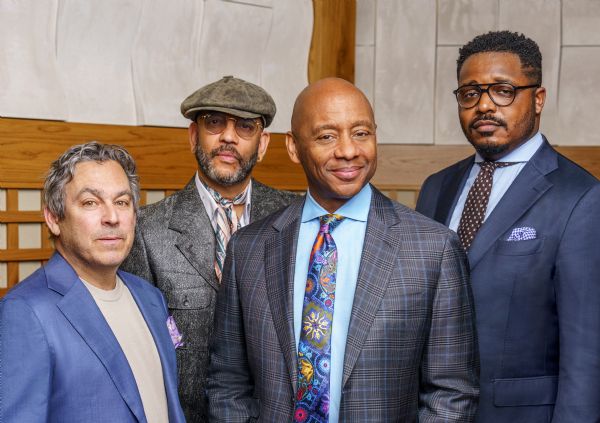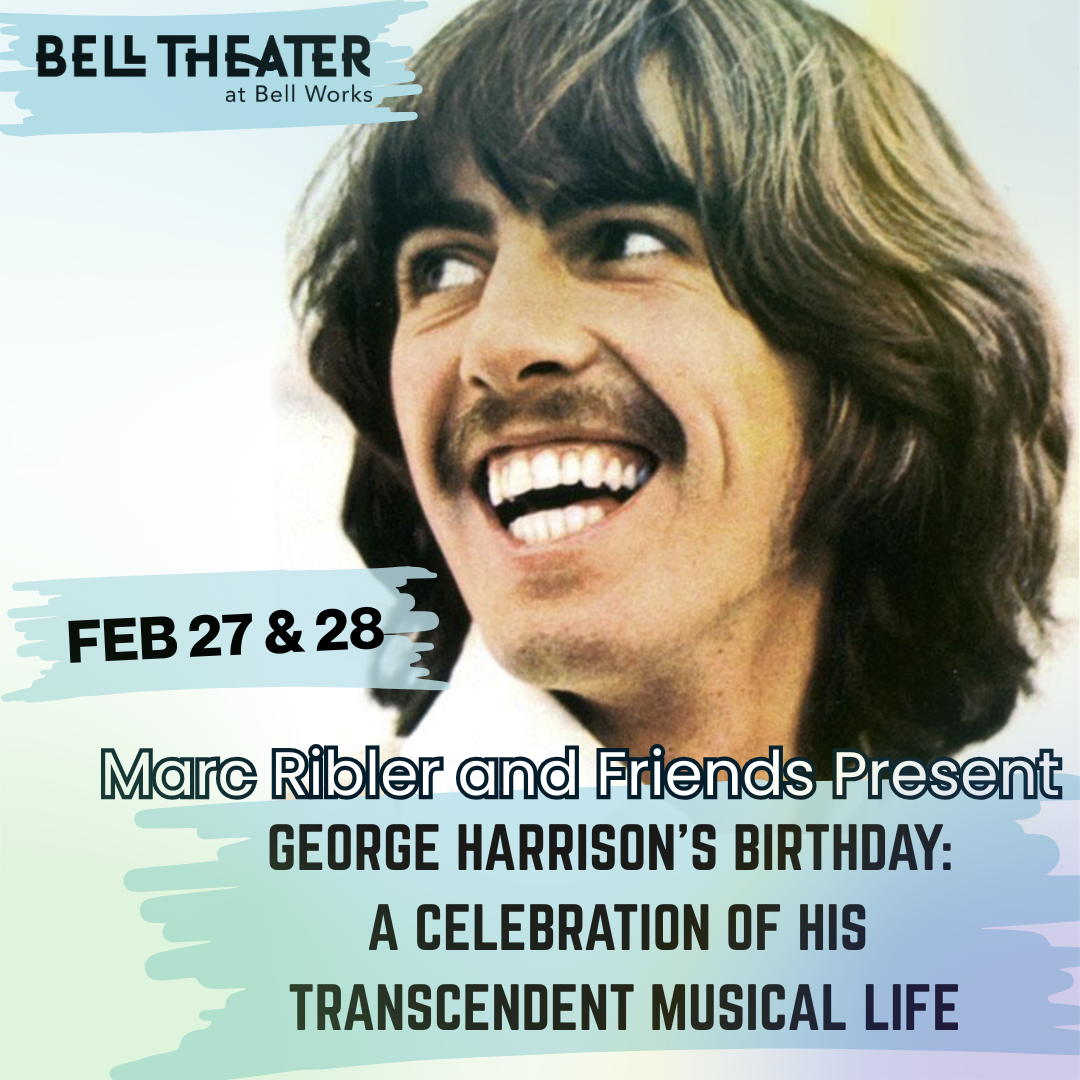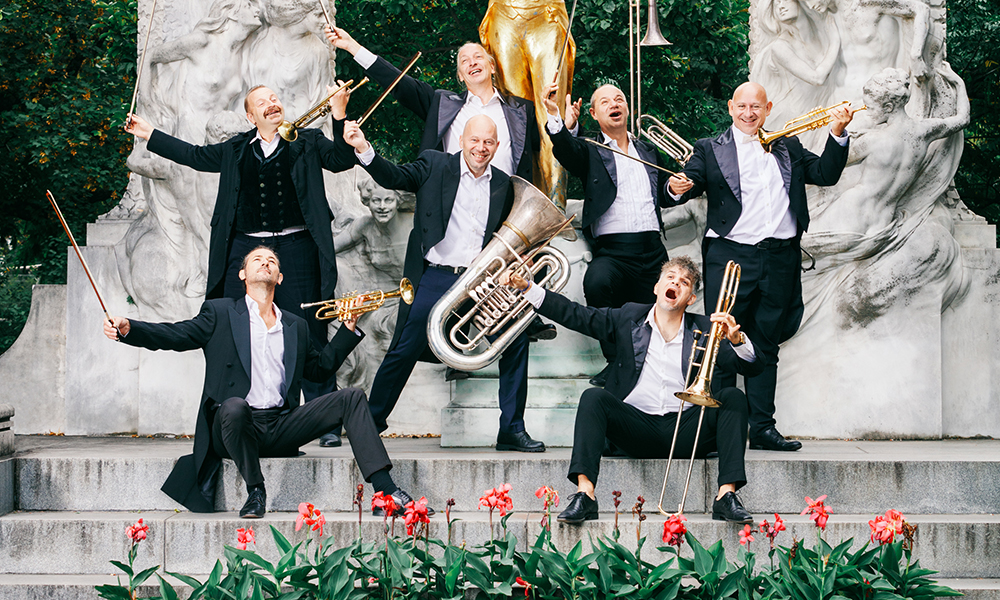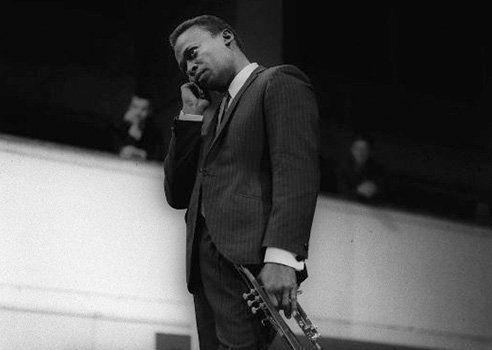By Danny Coleman
originally published: 12/03/2020

"I am very, very fortunate to be a blues man from Israel and to be signed to an American blues label; I paid my dues for it and I've worked for it," states Israel's most notable blues guitarist Andy Watts as he discussed his new album, working with blues greats Kenny Neal, Joe Louis Walker and Eliza Neals, the blues scene in his native land and more.
When one thinks of blues music, Israel doesn't come to the forefront as a bastion of the genre; so what does this American "Art form" mean to Watts?
"I think you have a lot of reasons to play the blues in the Middle East; just ask your presidents," he said with a large belly laugh."Sometimes people say that blues is a good way to ventilate your miseries. I think it is more than that, blues for me is an attitude; it's something that you have inside. I don't think you can really learn how to play the blues but that's just my two cents, I think that blues is something you identify as a music scene that is a free art form and some might say that blues are easy to play but it's difficult to feel it; maybe. Blues and jazz has a big following in Israel and for me it's an art form that gives you a lot of freedom because there are no boundaries. Blues is whatever you want it to be; Howling Wolf said, "Blues is when you cannot pay your rent; everything else is music," (laughs) but to me it's a free art form."
Blues music tends to get a bad reputation; terms like "Acquired taste," "Boring," "Old fashioned" are among some of the labels attached to the genre; mostly by those who have not taken a closer look at the very product itself. Yes, the blues were born from the struggles of the deep south and Mississippi Delta but as they evolved and various other forms like, swing, jump or Chicago style blues grew in popularity and morphed into rock 'n' roll; so too did the performers. The players varied their styles and approaches, borrowed and outright stole licks from their predecessors and put their own touches on previously written material and unlike its, "Brother from another mother" a.k.a. "Jazz," the blues tends to lie beneath the surface of pop culture; percolating until some new stud guitarist or Phenom brings it above ground once again.
However, there is a reason why there are "Jazz & Blues" festivals; although the two differ immensely in style and structure; they have similarities as well. One of those is the ability to freestyle or veer off the beaten path; to quote jazz pianist, the great Rio Clemente, "I like playing jazz because it will go as far as my mind will take me."
When told that jazz and blues players seem to elevate their game once on stage or appear to be on an otherworldly plain; Watts enthusiastically agreed.
"I don't sit before shows and try and memorize; I don't have a clue as to what I'm going to play," he said with a large laugh once again."The energy of the band and the situation will guide me; of course there are particular things that you have to play because it's part of the song but it's not a copy and paste thing; ya' know? You play and there's a musical path that you follow which will show you where to go. I have a big show, I have a nine piece band on the stage; a trombone, a saxophone, trumpet, B3 Hammond, bass, drums, two singers, so that's a big show. So, yeah, sure we have to follow a certain pattern but everything doesn't fall on the one; ya' know? The concept of the albums I do is blues, it's rock, it's psychedelic, it's jazzy, it's a free flow; I mix it all up."
Speaking of the album; his latest is titled "Supergroove" and he enlisted the help of some of his best blues buddies to make it.
"Supergroove;" I'm pleased with it. The idea was to start the album with "Supergroove" which was inspired by Johnny Winter, Freddie King and Albert Collins with the instrumental before we start the singing; instrumental thing for three and one half minutes and create a flowing album; ending it with "Supernatural" which is my tribute to Peter Green who passed not long after we released the album. I never met Peter but he has always been an inspiration to me. The idea behind "Supergroove" was that it has been a musical journey and I'm already with one foot promoting "Supergroove" and the other having Kenny and Joe and all of the guys coming back to play and looking forward to working on the next album; it's a never ending story."
"I've got Kenny Neal co-producing it with me; Joe Louis Walker and I, I wouldn't say we go way back but we go back 10 years at least. He has performed with me here in Israel three times; he sang the title track of my previous album "Blues On Fire" and "Burning Deep" I just feel shows the talent of Joe. He does amazing vocals on that song and that song has one of my favorite lines from the album, "The eyes might take a lie but the blues tells the truth" and what I meant by that is, a lot of people have these things that are burning inside them, these things are driving things in your life. I felt that Joe would connect with that and it is a song that's more of a blues ballad with the horn section and the Hammond; it's a big song and Joe put some amazing vocals on it and I think it came out nice."
"Blues of the Month Club"is a song that Joe released in 1995 and he and I have been playing it live and I said; you know what Joe? I'm gonna do that with Eliza (Neals)and I'm gonna put some horns on it and Joe said, "Yeah, do it Andy," so, I put horns on it, some blistering guitar and Eliza did some amazing vocals and I think it turned out really well."
"I have videos and not cell phone videos but really cool edited videos for every song on the album and you can see them on YouTube. I am easier to find on Facebook because that's where most of my fans here in Israel find me and that's under "Andy Watts Guitar Slinger," that's where you will find me."
Watts dedicated the album to the city of Tel Aviv, a cultural hub in Israel but the album cover itself has an interesting graphic; a yellow rhino. Is there a connection between the two?
"I dedicated this album to Tel Aviv, not for political reasons but because all of the artists that I have been bringing in who have performed all around the world and still, the place where I am creative is where I bring the people in and that is Tel Aviv. Tel Aviv is a very cool center of art and culture in Israel and in this particular neighborhood where I took the picture, there is very cool graffiti. I asked to put that rhino in the picture because when I'm writing lyrics, I'm writing gray; meaning it's not a straight story that's black and white. You can interpret what I'm writing any way you see fit; if you ask me; do you mean that? I'm going to say, yes that is true, because that's an artist also, he will never tell you you're wrong (laughs). When I did that I was sure that I was going to get asked; why a rhino in the picture? The truth is, I did it to get people to ask questions. The main thing you want to do in art is to get people to ask questions, otherwise; what do you do art for? There's an old saying with old Telecaster guitars; if you put a bridge pick-up on an old Telecaster; you can stop a rhino at 50 feet (laughs). People come to me and ask me why I'm playing these old guitars and you know, I can walk into a store and I'm sure that I can get a newer decent sounding guitar; the problem I have with that is they don't inspire me. All guitars have a story to tell, they've been around, they inspire you to play and that's the difference when you play vintage guitars; of course a lot of them have gotten so expensive because they are collector's items. We don't know what this current generation's relationship is going to be with vintage guitars. A lot of people say that the young kids today don't relate to the guitar the same way; I don't think so. I see a lot of people still into guitars; the funny thing is that Fender and Gibson have never sold as many guitars in their history as they've done since this Corona thing surfaced because people are home and they want to do something. I think the challenge for all of us today in business or music is to bring in a younger audience; that's the challenge.''
Israel and the blues; again the "Challenge" he refers to of engaging younger audiences or getting people to embrace the music is real. So what is the blues music scene like in his home country?
"It's far from America, the real deal is America. I consider myself fortunate to have been bringing the blues to Israel over the last 10 or 15 years. I've had Lucky Peterson here, may he rest in peace, Bernard Allison, Rick Estrin who plays the harp on the album on "Living Hand to Mouth" and "Don't Take My Blues Away" but he wanted to sort of be undercover and so there was no problem withAlligator Records he called himself "Coasting Hank." He used to perform under that name in the '60's and I had Johnny Winter here too, may he rest in peace. I've brought some of the best blues musicians in the world here to Israel, I've performed with them here with my band, I've recorded with them in the studio here in Israel and over the years that it took me to build a profile as sort of a blues ambassador here in Israel, bringing the good stuff here; I have seen, to my pleasure, the audiences getting bigger and I'm trying to convince the people here to integrate the blues with jazz like you do in New Orleans and other places to widen the audience. It's a far cry from America, we have clubs but we don't have the same amount, it's not the same size audiences; it's OK but I wish it was more. The main clubs are concentrated in the cities like Tel Aviv,Jerusalem, that's where you have the bigger clubs, the 350 or 400 seaters; that's where you have the bigger shows."
"For me personally? It is good for me today but it's hard work. The blues is a fire inside you, you believe in it and follow it and that's what I do and a lot of the blues musicians tell me the same thing. Lucky used to have his seat in Berlin in Germany, I lived in France for five years because there were better paying gigs than I could find in America. The big thing in America is the festivals; I am more selective where I play. Sometimes sure, I go out with my trio if I want to do a Hendrix kind of blues evening or a Cream sort of thing but when I take my nine piece band, I need to find venues that can justify such a big band and that is in America at festivals. "Andy Watts & Blues On Fire" is the name of my blues show and that's the one that I take on the road."
Facing what feels like an uphill climb to promote the music has now turned into a steep slope with the world-wide pandemic still wreaking havoc with live entertainment and public gatherings. Andy has not slowed down at all and he feels that most artists should take full advantage of their down time.
"I want to tell you, this COVID 19 thing has really caught people in the middle but you have to adjust to it. I did my last live show on the eleventh of March, which was some time ago. I have been very busy listening to music and supporting the release of the album and it has been getting a great response so far. I'm on the blues music reports, charting in the UK; I'm very pleased that it is all around the world. I've been very busy, I am going into the studio, nice and easy to prepare new music for Kenny for my next album. I have basically written a whole new album in the last seven months and I think that's a good thing to be crafting. Time is not coming back, you have to be crafting every day."
"We are in lockdown in Israel at the moment, maybe even stricter than America at the moment. I'm hoping that this will pass; as George Harrison once said, "All things must pass" and we have to hope for that; how long it is going to take is anybody's guess. We all hope for the best; I'm sure there are a lot of venues that will not reopen but I hope the ones that do can come back stronger than ever."
To discover more about Andy Watts, please visit www.andywattsguitarslinger.com.
That's it for this week! Please continue to support live and original music and until next week....ROCK ON!
This week's event listings
Arts Council of Princeton 102 Witherspoon Street Princeton
(609) 924-8777
Sat. 2:30 p.m. Ceramic Luminaria & Ornament Workshop. $45
Broken Goblet Brewing 2500 State Road Bensalem, PA
(267) 812-5653
Fri. 8:30 p.m. "First Fridays" w/ Cara Cartney
Wed. 8 p.m. Open Mic w/ Cara Cartney
All Shows 21+
Candlelight Lounge 24 Passaic Street Trenton
(609) 695-9612
Thurs. 6 p.m. Thursday Night Blues Jam Hosted by The Mojo Gypsies. $5 (Includes hot buffet)
Sat. 3 p.m. (TBA) $10 (cover charge/$10 Minimum includes buffet)
Championship Bar 931 Chambers street Trenton
(609) 396-5457
Tuesday 8 p.m. "Jam Night" Hosted by Nikki & Caleb
COARadio.com 125 South Main Street Hightstown
(609) 241-7103
Sun. 7 p.m. "Rock On Radio" feat. Lee Silverstone
Cooper's Riverview 50 Riverview Plaza Trenton
(609) 393-7300
Thurs. 7 p.m. Sara and the Sound
Fri. 7 p.m. Ear Candy
Sat. 7 p.m. The Pinheads
Mon. 7 p.m. "Sunny Monday Blues Jam" and Country Dance Night
Tues. 8 p.m. Karaoke w/ Karen and Mark
All Events Ages 21+
Dacey's Pub 215 West Philadelphia Avenue Morrisville, PA
(215) 295-4838
Fri. 6 p.m. Acoustic Music Night
Wed. 8 p.m. Quizzo
Dog & Bull Brew House 810 Bristol Pike (Rte. 13) Croydon, PA.
(215) 788-2855
Fri. 6 p.m. Brian Elliott
Sat. 4 p.m. Mike Estabrook
Sun. 4 p.m. Mia Johnson
Hopewell Valley Vineyards 46 Yard Avenue Pennington
(609) 737-4465
Fri. 4 p.m. "Music & Merlot" feat. Rick Winow
Sat. 4 p.m. "Music & Merlot" feat. Modern Rewind
Sun. 1 p.m. Carmen Marranco & Dave Sansoucie
Killarney's Publick House 1644 Whitehorse-Mercerville Road Hamilton
(609) 586-1166
Thurs. 6 p.m. "Girls Night Out"
Fri. 5 p.m. "Ugly Sweater Party"
Sat. 9 a.m./11 a.m. "Brunch with Santa"
Laurita Winery 85 Archertown Road New Egypt
(609) 752-0200
Sun. 3 p.m. "Atlantic Brass Band Holiday Concert"
Mamma Rosa's 572 Klockner Road Hamilton
(609) 588-5454
Sat. 6 p.m. Love & Duffy
Wed. 7 p.m. Karaoke
McGuinn's Place 1781 Brunswick Avenue Lawrence
(609) 392-0599
Fri. 9:30 p.m. Oregano Records Presents: "Artist Showcase"
Tues. 9 p.m. Karaoke
Memorial Park1950 Woodside Road Yardley, PA
Fri. 6:30 p.m. Holiday Drive In Movie "Elf." Gates open at 5:30 p.m., $30 (per vehicle)
Sat. 6:30 p.m. Holiday Drive In Movie "Home Alone." Gates open at 5:30 p.m., $30 (per vehicle)
New Hope Winery 6123 Lower York Road New Hope, PA
(215) 794-2331
Sat. 1 p.m. Holiday Fun w/ "Just Jeff"
Old Hights Brewing123 West Ward Street Hightstown
(609) 469-5976
Sat. 2 p.m. Recklesstown
Old Town Pub 135 Farnsworth Avenue Bordentown
(609) 291-9232
Thurs. 8 p.m. Quizzoholics Trivia
Palmer SquareNassau Street Princeton
Sat.12 p.m. Harmonics Quartet/Strolling Santa
Sun 12 p.m. Harmonics Quartet/Strolling Santa
Patriots Crossing 1339 River Road Titusville
(609) 737-2780
Thurs. 8 p.m. Open Mic Night
Wed. 7 p.m. "Quizzo"
River Horse Brewing Company2 Graphics Drive Ewing
(609) 883-0890
Fri. 2 p.m./4 p.m./6 p.m. "Indoor Reservations"
Sparky World Famous Beer Garden4333 New Falls Road Levittown, PA
(215) 943-2321
Thurs. 9 p.m. Karaoke
Mon. 9 p.m. Game Night w/ Kid Dalton
Tankard Pub440 Keim Boulevard Burlington
(609) 306-5079
Thurs. 7 p.m. The Williamsboy
Temperance House 5 South State Street Newtown, PA
(215) 944-8050
Thurs. 7p.m. "Blues Night" w/ Steve Guyger
Tues. 8 p.m. Trivia w/ Righteous Jolly (outdoors)
Wed. 7 p.m. Open Mic Night w/ Cara Cartney
The Cool Cricket 216 Burlington Street Fieldsboro
(609) 291-9110
Fri. 9 p.m. Karaoke
Sat. 6 p.m. Kindred Spirit
The Cure Insurance Center 81 Hamilton Ave. Trenton
(609) 656-3200
Check website for upcoming events
Tindall Road Brewing Co.102 Farnsworth Avenue Bordentown
(609) 526-8651
Fri. 6 p.m. "First Fridays" w/ The Coconuts
Triumph Brewing Company (New Hope, Pa. Location)
400 Union Square New Hope, Pa.
(215) 862-8300
Thurs. 8 p.m. Trivia
Sun. 7 p.m. Open Stage
All shows 21+
Vault Tap Room19 West College Avenue Yardley, PA
(267) 907-8550
Fri. 7 p.m. Love & Duffy
Sat. 7 p.m. Two For Flinching
Working Dog Winery 610 Windsor Perrineville Road Hightstown
(609) 371-6000
Sat. 12 p.m. Chris Giakas
Sun. 12 p.m. Kevin McGowan
WWFM 89.1 FM HD2 RadioMCCC Old Trenton Road West Windsor
Jazzon2.org
Mon. 7 p.m. "Danny Coleman's Got The Blues"
Danny Coleman is a veteran musician and writer from central New Jersey. He hosts a weekly radio program entitled 'Rock On Radio' airing Sunday evenings at 7:00pm EST on ThePenguinRocks.com where he features indie/original bands and solo artists.

















